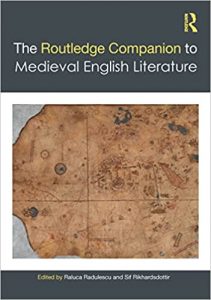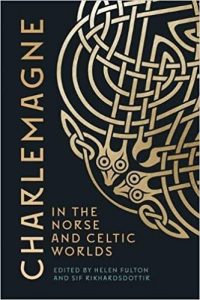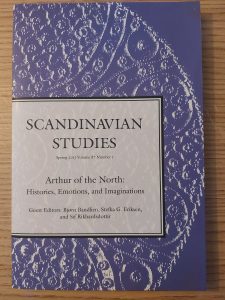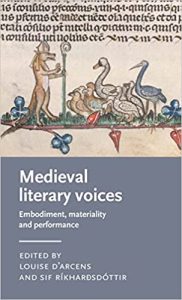Publications
 EMOTION IN OLD NORSE LITERATURE
EMOTION IN OLD NORSE LITERATURE
Translations, Voices, Contexts
Studies in Old Norse Literature I (Cambridge: D. S. Brewer, 2017)
Draws on Old Norse literary heritage to explore questions of emotion as both a literary motif and as a social phenomenon.
Authors throughout history have relied on the emotional make-up of their readers and audiences to make sense of the behaviours and actions of fictive characters. But how can a narrative voice contained in a text evoke feelings that are ultimately never real or actual, but a figment of a text, a fictive reality created out of words? How does one reconcile interiority - a presumed modern conceptualisation - with medieval emotionality?
The volume seeks to address these questions. It positions itself within the larger context of the history of emotion, offering a novel approach to the study of literary representations of emotionality and its staging through voice, performativity and narrative manipulation, probing how emotions are encoded in texts. The author argues that the deceptively laconic portrayal of emotion in the Icelandic sagas and other literature reveals an emotive script that favours reticence over expressivity and exposes a narrative convention of emotional subterfuge through narrative silences and the masking of emotion. Focusing on the ambivalent borders between prose and poetic language, she suggests that poetic vocalisation may provide a literary space within which emotive interiority can be expressed. The volume considers a wide range of Old Norse materials - from translated romances through Eddic poetry and Íslendingasögur (sagas of Icelanders) to indigenous romance.
- 'tour de force interdisciplinary examination of literary emotionality that is equal parts stand-alone argument, intervention, and invitation', The Medieval Review (2018)
- 'this timely book soars beyond other approaches to medieval emotionality', Speculum (2019)
- 'This book will, no doubt, become the essential starting point for all further studies of the literary representation of emotions in Old Norse studies', Medium Aevum (2020)
- 'This book is a vitally significant piece of scholarship that is genuinely traillazing and that provides nuanced - and much needed - theoretical models for the study of literary emotion in premodern literatures', Speculum (2019)
Read an interview about emotions on Kjarninn
Read a review of Emotion in Old Norse Literature in The Medieval Review (by Melissa Elmes)
MEDIEVAL TRANSLATIONS AND CULTURAL DISCOURSE
The Movement of Texts in England, France and Scandinavia
(Cambridge: D. S. Brewer, 2012)
An examination of what the translations of medieval French texts into different European languages can reveal about the differences between cultures.
Throughout the middle ages, many Francophone texts - chansons de geste, medieval romance, works by Chrétien de Troyes and Marie de France - were widely translated in north-western Europe. In the process, these texts were frequently transformed to reflect the new cultures in which they appeared. This book argues that such translations, prime sites for cultural movement and encounters, provide a rich opportunity to study linguistic and cultural identity both in and through time. Via a close comparison of a number of these texts, examining the various modifications made, and drawing on a number of critical discourses ranging from post-colonial criticism to translation theory, the author explores the complexities of cultural dialogue and dissent. This approach both recognises and foregrounds the complex matrix of influence, resistance and transformations within the languages and cultural traditions of medieval Europe, revealing the undercurrents of cultural conflict apparent in medieval textuality.
- 'A superb and important study of the reception of French texts in English and Scandinavian realms and their acculturation in different times and among different reading communities', JEGP (2012)
- 'a ground-breaking model for the future of translation studies', Medium Aevum (2013)
- 'This is a substantial work, which presents a wide-ranging investigation of a significant web of cross-cultural literary relations in medieval Europe', SAC (2013)
Read the introduction here: Rikhardsdottir-introduction!
♦♦♦♦♦♦♦♦
Edited volumes
ROUTLEDGE COMPANION TO MEDIEVAL ENGLISH LITERATURE
Edited by Raluca Radulescu and Sif Rikhardsdottir
Routledge Literature Companions (New York and London: Routledge, 2022)
 The Routledge Companion to Medieval English Literature offers a new, inclusive, and comprehensive context to the study of medieval literature written in the English language from the Norman Conquest to the end of the Middle Ages. Utilising a Trans-European context, this volume includes essays from leading academics in the field across linguistic and geographic divides. Extending beyond the traditional scholarly discussions of insularity in relation to Middle English literature and ‘isolationism’, this volume:
The Routledge Companion to Medieval English Literature offers a new, inclusive, and comprehensive context to the study of medieval literature written in the English language from the Norman Conquest to the end of the Middle Ages. Utilising a Trans-European context, this volume includes essays from leading academics in the field across linguistic and geographic divides. Extending beyond the traditional scholarly discussions of insularity in relation to Middle English literature and ‘isolationism’, this volume:
- Oversees a variety of genres and topics, including cultural identity, insular borders, linguistic interactions, literary gateways, Middle English texts and traditions, and modern interpretations such as race, gender studies, ecocriticism, and postcolonialism.
- Draws on the combined extensive experience of teaching and research in medieval English and comparative literature within and outside of anglophone higher education and looks to the future of this fast-paced area of literary culture.
- Contains an indispensable section on theoretical approaches to the study of literary texts.
This Companion provides the reader with practical insights into the methods and approaches that can be applied to medieval literature and serves as an important reference work for upper-level students and researchers working on English literature.
See Routledge Companion-Table of Contents
Preview the book here!
Listen to an interview about one of the chapters and how it came about!
CHARLEMAGNE IN THE NORSE AND CELTIC WORLDS
Edited by Helen Fulton and Sif Rikhardsdottir
Bristol Studies in Medieval Culture (Cambridge, D. S. Brewer, 2022)
 Captured here for the first time is the richness of the Charlemagne tradition in medieval Norway, Sweden, Denmark, Iceland, Wales and Ireland and its coherence as a series of adaptations of Old French chansons de geste. The reception of the Charlemagne legends among Nordic and Celtic communities in the Middle Ages is a shared story of transmission, translation, an exploration of national identity, and the celebration of imperialism. The articles brought together here capture for the first time the richness of the Charlemagne tradition in medieval Norway, Sweden, Denmark, Iceland, Wales and Ireland and its coherence as a series of adaptations of Old French chansons de geste. Emerging from the French sources is a set of themes which unite the linguistically different Norse and Celtic Charlemagne traditions. The ideology of the Crusades, the dichotomy of Christian and heathen elements, the values of chivalry and the ideals of kingship are among the preoccupations common to both traditions. While processes of manuscript transmission are distinctive to each linguistic context, the essential function of the legends as explorations of political ideology, emotion, and social values creates unity across the language groups. From the Old Norse Karlamagnús saga to the Irish and Welsh narratives, the chapters present a coherent set of perspectives on the northern reception of the Charlemagne legends beyond the nation of England.
Captured here for the first time is the richness of the Charlemagne tradition in medieval Norway, Sweden, Denmark, Iceland, Wales and Ireland and its coherence as a series of adaptations of Old French chansons de geste. The reception of the Charlemagne legends among Nordic and Celtic communities in the Middle Ages is a shared story of transmission, translation, an exploration of national identity, and the celebration of imperialism. The articles brought together here capture for the first time the richness of the Charlemagne tradition in medieval Norway, Sweden, Denmark, Iceland, Wales and Ireland and its coherence as a series of adaptations of Old French chansons de geste. Emerging from the French sources is a set of themes which unite the linguistically different Norse and Celtic Charlemagne traditions. The ideology of the Crusades, the dichotomy of Christian and heathen elements, the values of chivalry and the ideals of kingship are among the preoccupations common to both traditions. While processes of manuscript transmission are distinctive to each linguistic context, the essential function of the legends as explorations of political ideology, emotion, and social values creates unity across the language groups. From the Old Norse Karlamagnús saga to the Irish and Welsh narratives, the chapters present a coherent set of perspectives on the northern reception of the Charlemagne legends beyond the nation of England.
Read about the volume in the Medieval Herald including a discount offer!
MEDIEVAL LITERARY VOICES: EMBODIMENT, MATERIALITY AND PERFORMANCE
Edited by Louise D'Arcens and Sif Rikhardsdottir
Manchester Medieval Literature and Culture (Manchester: Manchester University Press, 2022)
Voice is a fleeting physical phenomenon that leaves behind traces of its existence. Medieval literary voices offers a wide-reaching approach to the concept of literary voices, both the vanished authorial ones and the implicit textual ones. Its impressive lineup deepens our understanding of how literary voices evoke the elusive voices lurking beyond the text, capturing the absent authorial voice, the traces of scribal voices and the soundscape of the uttered text. It explores multiple dimensions of medieval voice and vocalisations, and the interactions between literary voices and their authorial, scribal and socio-political settings. It contends that through the theorizing of literary voices we can begin to understand the ways in which medieval voices mediate or proclaim an embodied selfhood or material presence, how they dictate or contest moral conventions, and how they create and sustain narrative soundscapes.
See the content list
A CRITICAL COMPANION TO OLD NORSE LITERARY GENRE
Edited by Massimiliano Bampi, Carolyne Larrington and Sif Rikhardsdottir
Studies in Old Norse Literature V (Cambridge: D. S. Brewer, 2020)
In Old Norse studies, genre has been central to the categorisation, evaluation and understanding of medieval prose and poetry alike; yet its definition has been elusive and its implications often left unexplored. This volume opens up fundamental questions about Old Norse genre in theory and in practice. It offers an extensive range of theoretical approaches, investigating and critiquing current terms and situating its arguments within early Scandinavian and Icelandic oral-literary and manuscript contexts. It maps the ways in which genre and form engage with key thematic areas within the literary corpus, noting the different kinds of impact upon the genre system brought about by conversion to Christianity, the gradual adoption of European literary models, and social and cultural changes occurring in Scandinavian society; while a case-study section probes both prototypical and hard-to-define cases
Read a blog post about how the Critical Companion came about!
.
ARTHUR OF THE NORTH: HISTORIES, EMOTIONS AND IMAGINATIONS, Special Issue of Scandinavian Studies 87.1 (2015), edited by Bjørn Bandlien, Stefka G. Eriksen and Sif Rikhardsdottir (See excerpt on Project Muse)
The articles included in this issue of Scandinavian Studies accentuate the core characteristic of the Arthurian material, both in the North and beyond: that is, that Arthurian literature is a pan-European tradition that extends across both cultural communities and historical periods, while it simultaneously testifies to the multitude of linguistic, cultural, and emotional communities in medieval Europe. These articles reflect the growing recognition of and appreciation for the Nordic translations of Arthurian material as cultural evidence of the communities that created and preserved them. Furthermore, they highlight the fertile avenues and yet unexplored territories of Nordic Arthurian research into emotions, cognition, and landscape studies, while revealing also the relevance of historical acuity and continuity with respect to the Arthurian legacy in the North and its potential impact on Nordic literary traditions. These topics - the transmission and function of histories, emotions, and imaginations - are garnering increasing interest in medieval literary studies in general. Thus this volume showcases some of the unique aspects of the Northern Arthurian literary heritage, while simultaneously addressing its place within the larger context of the transmission of Arthurian narrative in Europe.
♦♦♦♦♦♦♦♦
Articles and Book Chapters
'The Venetian Gateway: Commerce, Plague, Oriental Motifs', in Routledge Companion to Medieval English Literature, edited by Raluca Radulescu and Sif Rikhardsdottir (New York and London: Routledge, 2022), pp. 173-85 (See online interview on the chapter here)
'Medieval English Literature: A Trans-European Literary History', with Raluca Radulescu, in Routledge Companion to Medieval English Literature, edited by Raluca Radulescu and Sif Rikhardsdottir (New York and London: Routledge, 2022), pp. 1-12
'The Norse Roland in Context', in Charlemagne in the Norse and Celtic Realms, edited by Helen Fulton and Sif Rikhardsdottir (Cambridge: D. S. Brewer, 2022), pp. 50-65
'Transmission of Charlemagne Material in Scandinavia, Wales and Ireland', with Helen Fulton, in Charlemagne in the Norse and Celtic Realms, edited by Helen Fulton and Sif Rikhardsdottir (Cambridge: D. S. Brewer, 2022), pp. 1-16
'Voice, Materiality and History in St Erkenwald and Egils saga Skallagrímssonar', in Medieval Literary Voices: Embodiment, Materiality and Performance, ed. by Louise D'Arcens and Sif Rikhardsdottir (Manchester: Manchester University Press, 2022), pp. 193-211
'Menningarstraumar og menningararfur frá Vǫluspá til Partalopa sögu' [Cultural Influences and Cultural Heritage from Vǫluspá to Partalopa sögu], in Rætur Völuspár, edited by Pétur Pétursson and Þórhallur Eyþórsson (Reykjavík: Hið íslenska bókmenntafélag, 2022), pp. 43-60
'Oceanic Networks: Literary Production, Transmission and Mediation Across the North', in The Meaning of Media: Medieval Scandinavian Text Culture from Epigraphy to Typography, edited by Anna Catherina Horn and Karl G. Johansson, Modes of Modification I (Berlin and Boston: De Gruyter, 2021), pp. 103-24 (Open Access here!) (Rikhardsdottir-Oceanic Networks 2021)
‘Poetic Sensorium and Aesthetic Objectification in the Middle English Pearl’, Exemplaria 32.4 (2020), 283-303; DOI: https://doi.org/10.1080/10412573.2020.1846311 (eprint accessible here!)
'Introduction to Genre', with Massimiliano Bampi, in A Critical Companion to Old Norse Literary Genre, edited by Massimiliano Bampi, Carolyne Larrington and Sif Rikhardsdottir, Studies in Old Norse Literature V (Cambridge: D. S. Brewer, 2020), pp. 1-14
'Hybridity', in A Critical Companion to Old Norse Literary Genre, edited by Massimiliano Bampi, Carolyne Larrington and Sif Rikhardsdottir, Studies in Old Norse Literature V (Cambridge: D. S. Brewer, 2020), pp. 31-46
'The Margins of Literary History: Sagas, Eddic Poetry and World Literature', in A Companion to World Literature, gen. ed. Ken Seigneurie, vol. II: 601 CE-1450 CE, edited by Christine Chism (London and New York: Blackwell-Wiley, 2020), pp. 979-92
‘Empire of Emotion: The Formation of Emotive Literary Identities and Mentalities in the North’, in Crossing Borders in the Insular Middle Ages, edited by Aisling Byrne and Victoria Flood, Medieval Texts and Cultures of Northern Europe 30 (Turnhaut: Brepols, 2019), pp. 189-210 (Rikhardsdottir-Empire of Emotion 2019)
‘The Phantom of Romance: Traces of Romance Transmission and the Question of Originality’, in Medieval Romance Across European Borders, edited by Miriam Muth, Medieval Narratives in Transmission 1 (Turnhaut: Brepols, 2018), pp. 133-51 (Rikhardsdottir-Phantom of a Romance 2018)
'Chronology, Anachronism and Translatio Imperii', in Handbook of Arthurian Romance: King Arthur’s Court in Medieval European Literature, edited by Johnny McFadyen and Leah Tether (Berlin: De Gruyter, 2017), pp. 135-49 (Rikhardsdottir-Chronology Anachronism and Translatio imperii 2017)
‘Medieval Emotionality: The Feeling Subject in Medieval Literature’, Comparative Literature 69.1 (2017), 74-90 (Rikhardsdottir-Medieval Emotionality 2017)
‘Translating Emotion: Vocalisation and Embodiment in Yvain and Ívens saga’, Emotions in Medieval Arthurian Literature: Body, Mind, Voice, edited by Frank Brandsma, Carolyne Larrington and Corinne Saunders (Cambridge: D. S. Brewer, 2015), pp. 161-79 (Rikhardsdottir-Translating Emotion 2015)
'Arthur of the North: Histories, Emotions, and Imaginations,' with Bjørn Bandlien and Stefka G. Eriksen, Scandinavian Studies 87.1 (2015), 1-7 (Arthur of the North-Histories Emotions and Imaginations)
‘The Gawain Poet’, in Oxford Handbooks Online, ed. James Simpson (Oxford: Oxford University Press, 2014), DOI: 10.1093/oxfordhb/9780199935338.013.94 (Rikhardsdottir-The Gawain Poet 2014)
Sif Rikhardsdottir and Stefka G. Eriksen, ‘État présent: Arthurian Literature in the North’, Journal of the International Arthurian Society 1.1 (2013), 3-28 (Rikhardsdottir and Eriksen-État présent Arthur of the North)
‘Hugræn fræði, tilfinningar og miðaldir’ [Cognitive Studies, Emotions and the Middle Ages] Ritið 3 (2012), 67-89. Special Issue on Cognitive Studies, edited by Þórhallur Eyþórsson and Bergljót Kristjánsdóttir (Rikhardsdottir-Hugræn fræði tilfinningar og miðaldir)
‘Meykóngahefðin í riddarasögum. Hugmyndafræðileg átök um kynhlutverk og þjóðfélagsstöð’ [The Maiden King Tradition in Icelandic Romance. Ideological Conflict regarding Gender Roles and Social Positioning] Skírnir 184 (haust 2010), 410-33 (Rikhardsdottir-Meykóngahefðin í riddarasögum)
‘The Imperial Implications of Medieval Translations. A Comparative Analysis of the Old Norse and Middle English Versions of Marie de France´s Lais’, Studies in Philology 105.2 (2008), 144-64 (Rikhardsdottir-Imperial Implications of Medieval Translations)
‘Fragments of Danish History. A Translation of Danasaga Arngríms lærða’, American Notes and Queries 20.1 (2007), 1-33. Translation project in collaboration with Clarence Miller and Paul Acker
‘Bound by Culture. A Comparative Study of the Old French and Old Norse Versions of La Chanson de Roland’, Mediaevalia 26.2 (2005), 243-64. Special Issue: Translation in the Middle Ages and Renaissance: The Survival of Culture, edited by Marilyn Gaddis Rose (Rikhardsdottir-Bound by Culture)
♦♦♦♦♦♦♦♦
Reviews
Review of Middle English Marvels: Magic, Spectacle, and Morality in the Fourteenth Century, by Tara Williams, in Studies in the Age of Chaucer 41 (2018), 516-20
Review of The Bookish Riddarasögur: Writing Romancer in Late Medieval Iceland, by Geraldine Barnes, in Saga-Book XXXIX (2015), 115-18
Review of Francia et Germania: Studies in Strengleikar and Þiðreks saga af Bern, edited by Karl G. Johansson and Rune Flaten, in Saga-Book XXXVIII (2014), 147-9
Review of Chaucer in Denmark: A Study of the Translation and Reception History 1782-2012, by Ebbe Klitgård, in Medieval Review (2014)
Review of Affective Literacies: Writing and Multilingualism in the Late Middle Ages, by Mark Amsler, in JEGP 113.2 (2014), 234-7
Review of The Arthur of the North. The Arthurian Legend in the Norse and Rus' Realms, edited by Marianne E. Kalinke, in Medieval Review (2012)
Review of Tiodielis saga, edited by Tove Hovn Ohlsson, in European Journal of Scandinavian Studies 42.1 (2012), 90-2
Reviews of Emotion in Old Norse Literature in The Medieval Review (2018) by Melissa Elmes; Comitatus 49 (2018) by Anne Le; Scandinavia 57.2 (2018) by Rory McTurk; JEGP 118.2 (2019) by Kirsten Wolf; Parergon 36.1 (2019) by Matthew Firth; Saga-Book 43 (2019) by Edel Porter; Speculum 94.4 (2019) by Gareth Lloyd Evans, Medium Aevum 84.1 (2020) by Siân Grønlie.
Reviews of Medieval Translations and Cultural Discourse in Translation and Literature 24.1 (2015) by Jane Griffiths, Saga-Book 38 (2014) by Erin Goeres, French Studies 67.2 (2013) by Keith Busby, Medium Aevum 82.1 (2013) by Carolyne Larrington, SAC 35 (2013) by Geraldine Barnes, Arthuriana 23.4 (2013) by Matthieu Boyd, Zeitschrift für deutsches Althertum 142.3 (2013) by Erich Poppe, Comparative Critical Studies 10.3 (2013) by Elizabeth Boyle, Speculum 88.1 (2013) by Suzanne Marti, Scripta Islandica 64 (2013) by Lars Wollin, JEGP 111.4 (2012) by Marianne Kalinke, The Medieval Review (2012) by Torfi Tulinius, BiblioBuffet (2012) by Gillian Polack.


